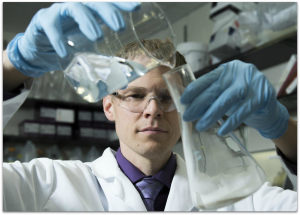
A team lead by Brad Bundy, chemical engineering associate professor, is paving the way for new life-saving vaccine technology.
Image: Mark A. Philbrick
When viruses emerge—spreading in a rapid and extensive way—researchers must scramble to create life-saving vaccines. At Brigham Young University, researchers are working to speed up that process.
A team of chemical engineers has devised a way to create machinery for vaccine production en masse, freeze drying the produced vaccines and stockpiling them for future use. This development could aid in relief efforts when new viruses hit populations, allowing researchers to rapidly produce vaccines.
“You could just pull it off the shelf and make it,” says Brad Bundy, senior author of the study. “We could make the vaccine and be ready for distribution in a day.”
This from Brigham Young University:
Bundy’s idea is a new angle on the emerging method of ‘cell-free protein synthesis,’ a process that combines DNA to make proteins needed for drugs (instead of growing protein in a cell). His lab is creating a system where the majority of the work is done beforehand so vaccine kits can be ready to go and be activated at the drop of a dime.
“It will not only provide a quicker response to pandemics, but it will also make protein-based drugs more available to third-world countries where production and refrigerated storage can be problematic,” says William Pitt, co-author of the study.
The researchers hope that through this development, life-saving treatments will be more readily available and patient expense will drop.
“The drugs today are changing,” says Bundy. “The lifesaving cancer drugs we have now, the drugs for arthritis, the drugs with the greatest impact, are made out of proteins, not small chemical molecules. This method takes full advantage of that to provide a quicker, more personal response.”

